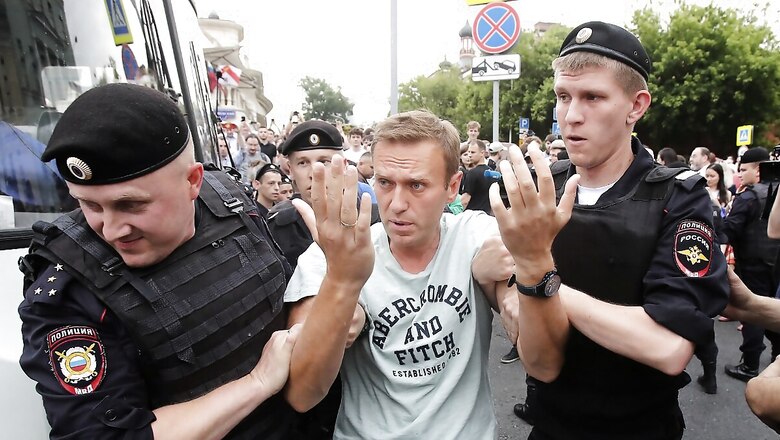
views
Alexei Navalny, the most prominent critic of Russian President Vladimir Putin who staged massive anti-Kremlin protests, died in prison Friday, Russia’s prison agency said. He was 47.
In a statement, the Federal Penitentiary Service said that Navalny felt unwell after a walk on Friday and lost consciousness. Navalny’s press secretary Kira Yarmysh said his team had not been informed of his death. “Alexei’s lawyer is now flying to Kharp,” where his prison colony is, she said in a post on social media.
Who was Alexei Navalny?
Navalny was born in Butyn, about 40 kilometers outside Moscow. He received a law degree from People’s Friendship University in 1998 and did a fellowship at Yale in 2010.
He emerged as a prominent figure within Russia’s opposition and was revered by his supporters. He had been behind bars since January 2021, when he returned to Moscow after recuperating in Germany from nerve agent poisoning that he blamed on the Kremlin.
Navalny’s journey to prominence began with his exposés on corruption within Russia’s elite, using blogs to shed light on systemic issues. Despite facing expulsion from political parties for his nationalist views, Navalny persisted in his mission to challenge the status quo. Before his arrest, he campaigned against official corruption, organised major anti-Kremlin protests and ran for public office.
Confronting the Kremlin
Navalny’s activism against Putin’s government led to numerous detentions and prosecutions, all of which he contends were politically motivated. The Kremlin has consistently dismissed Navalny’s allegations of corruption and portrayed him as an extremist puppet controlled by Western intelligence agencies.
Despite facing legal challenges and government opposition, Navalny remained steadfast in his pursuit of political reform and accountability. He continued to raise his voice via various channels even after he was imprisoned.
‘That Person’
In Putin’s Russia, political opponents went into exile after imprisonment, suspected poisonings, or repression. But Navalny grew consistently stronger and reached the apex of the opposition, according to US media.
His popularity increased after the leading politician, Boris Nemtsov, was shot and killed in 2015 on a bridge near the Kremlin. Whenever the Russian President spoke about Navalny, he made it a point to never mention the activist by name, referring to him as “that person” or similar wording.
Poisoning and International Fallout
The attempted assassination of Navalny in August 2020 shocked the world, as he fell critically ill from a nerve agent poisoning. Following extensive medical treatment in Germany, Navalny returned to Russia to continue his activism, despite the inherent risks.
Investigations into the poisoning implicated Russia’s FSB security service, though the Russian government dismissed these allegations. Navalny, who was serving a 19-year sentence on charges of extremism, was moved in December from his former prison in the Vladimir region to the highest security level of prisons in Russia, above the Arctic Circle.
(With agency inputs)




















Comments
0 comment